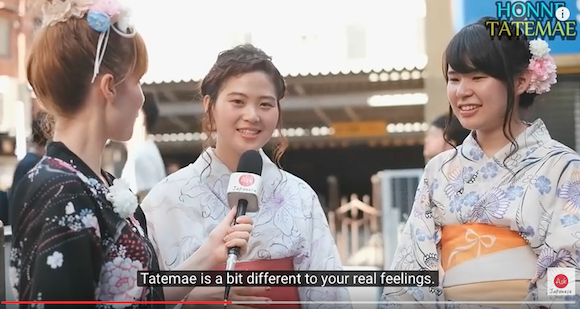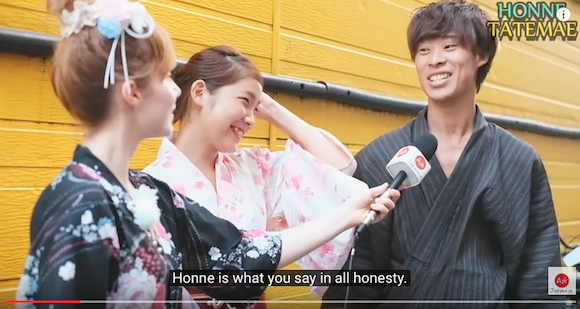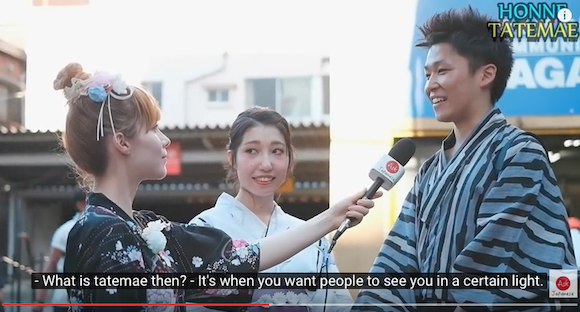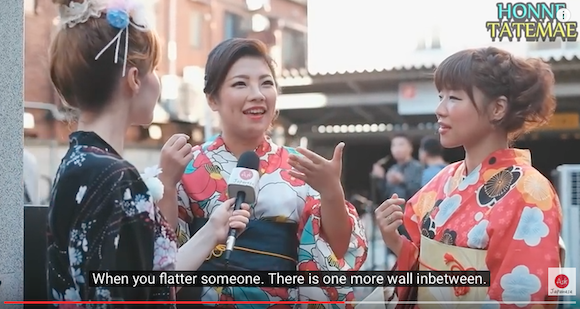
People on the street in Japan explain the reasons why they sometimes have to tell white lies in social situations.
YouTube channel Ask Japanese has produced a number of videos featuring people on the streets of Japan over the past year, asking them to reveal their thoughts on a number of curious topics, including ideal Japanese body types and what foreign tourists take photos of with their mobile phones. This time they’re tackling the complex issues of honne and tatemae, two main pillars of social etiquette which dictate the way people relate to each other in Japanese society, where harmony of the group is considered to be far more important then the desires of the individual.
▼ Take a look at some explanations of honne and tatemae in the video below.
Honne, which translates to “real intention” in Japanese, is mostly used with close family members and select friends and rarely revealed in formal social or professional settings, given that the true thoughts and desires of an individual person are far less important than the “wa”, or harmony of the group. This is particularly true if you’re not in a senior position, and it’s the reason why people refrain from voicing their opinions in meetings that can go on for hours, and why they ignore their personal desires to instead “ganbaru”, or persevere, with tough situations and requests despite not really having the time nor the inclination to do so.
Whereas honne relates to the feelings and actions you conceal when interacting in a group, tatemae, which translates to “face” or “public position”, relates to the things you say and do while interacting with others, in order to make people happy and create a good time for everyone involved.
Flattery and humility are vital components of tatemae, which explains why people are quick to heap praise on foreigners who can barely hold two chopsticks together, and why a master of a craft or skill will refuse to receive compliments, no matter how much immense talent they might possess.
While some people might look on these “white lies” as a form of dishonesty, for Japanese people, it’s simply a way to honour and respect the social standing of others while maintaining group equilibrium.
While the concepts of honne and tatemae might seem difficult at first to understand, this video does a good job of exploring the topic with the help of Japanese people, who admit that it can be difficult even for them to understand! To find out more about what people in Japan think about other interesting issues, check out the Ask Japanese YouTube channel for more videos!
Source: YouTube/Ask Japanese
Top Image: YouTube/Ask Japanese
Screenshots: YouTube/Ask Japanese





 Are Japanese people shy? Or is their politeness getting a little lost in translation?【Video】
Are Japanese people shy? Or is their politeness getting a little lost in translation?【Video】 Even Japanese people are frightened by the concealed anger in Kyoto compliment foreigner received
Even Japanese people are frightened by the concealed anger in Kyoto compliment foreigner received Foreign tourists share their impressions of Japanese men【Video】
Foreign tourists share their impressions of Japanese men【Video】 Polish songstress releases debut Japanese album, shares her loves and dislikes about Japan
Polish songstress releases debut Japanese album, shares her loves and dislikes about Japan Are Japan’s efforts at internationalization succeeding or not?
Are Japan’s efforts at internationalization succeeding or not? How to order snacks on a Shinkansen bullet train in Japan
How to order snacks on a Shinkansen bullet train in Japan Demon Slayer: Kimetsu no Yaiba gets new roller coaster attractions and food at Universal Studios Japan
Demon Slayer: Kimetsu no Yaiba gets new roller coaster attractions and food at Universal Studios Japan New samurai glasses are Japan’s latest weird must-have souvenir
New samurai glasses are Japan’s latest weird must-have souvenir Burger King Japan suddenly adds Dr. Pepper and Dr. Pepper floats to its menu nationwide
Burger King Japan suddenly adds Dr. Pepper and Dr. Pepper floats to its menu nationwide Nintendo history you can feel – Super NES, N64, and GameCube controllers become capsule toys
Nintendo history you can feel – Super NES, N64, and GameCube controllers become capsule toys High-fashion Totoro cuddle purse is like an elegant stroll in the forest【Photos】
High-fashion Totoro cuddle purse is like an elegant stroll in the forest【Photos】 Japan’s new difficult-to-drink-from beer glass protects your liver, but it’s a brutal experience
Japan’s new difficult-to-drink-from beer glass protects your liver, but it’s a brutal experience Kyoto Tower mascot termination reveals dark side behind cute Japanese characters
Kyoto Tower mascot termination reveals dark side behind cute Japanese characters New Pokémon ice cream, dessert drinks, and cool merch coming to Baskin-Robbins Japan【Pics】
New Pokémon ice cream, dessert drinks, and cool merch coming to Baskin-Robbins Japan【Pics】 To combat declining birth rate, Japan to begin offering “Breeding Visas” to foreigners
To combat declining birth rate, Japan to begin offering “Breeding Visas” to foreigners Hello, cosmetics! Clinique teams up with Hello Kitty this summer for first-time collaboration
Hello, cosmetics! Clinique teams up with Hello Kitty this summer for first-time collaboration “The most Delicious Cup Noodle in history” – Japan’s French Cup Noodle wins our heart【Taste test】
“The most Delicious Cup Noodle in history” – Japan’s French Cup Noodle wins our heart【Taste test】 Starbucks releases a cute Frappuccino and Unicorn Cake…but not in Japan
Starbucks releases a cute Frappuccino and Unicorn Cake…but not in Japan McDonald’s Japan’s Soft Twist Tower: A phantom ice cream only sold at select branches
McDonald’s Japan’s Soft Twist Tower: A phantom ice cream only sold at select branches Yabai Ramen: What makes this Japanese ramen so dangerous?
Yabai Ramen: What makes this Japanese ramen so dangerous? Finally! Nintendo Japan expands Switch 8-bit controller sales to everybody, Online member or not
Finally! Nintendo Japan expands Switch 8-bit controller sales to everybody, Online member or not Japanese government wants to build luxury resorts in all national parks for foreign tourists
Japanese government wants to build luxury resorts in all national parks for foreign tourists 10 things you should buy at 7-Eleven in Japan
10 things you should buy at 7-Eleven in Japan Studio Ghibli releases anime heroine cosplay dresses that are super comfy to wear
Studio Ghibli releases anime heroine cosplay dresses that are super comfy to wear Woman charged for driving suitcase without a license in Osaka
Woman charged for driving suitcase without a license in Osaka Studio Ghibli unveils My Neighbour Totoro miniature house model
Studio Ghibli unveils My Neighbour Totoro miniature house model Kyoto experiencing problems with foreign tourists not paying for bus fares, but not on purpose
Kyoto experiencing problems with foreign tourists not paying for bus fares, but not on purpose Fighting mild hunger with a Japanese soda that turns into jelly in the stomach【Taste test】
Fighting mild hunger with a Japanese soda that turns into jelly in the stomach【Taste test】 Studio Ghibli’s Howl’s Moving Castle tapestry unveiled in Japan for first time
Studio Ghibli’s Howl’s Moving Castle tapestry unveiled in Japan for first time McDonald’s new Happy Meals offer up cute and practical Sanrio lifestyle goods
McDonald’s new Happy Meals offer up cute and practical Sanrio lifestyle goods Sales of Japan’s most convenient train ticket/shopping payment cards suspended indefinitely
Sales of Japan’s most convenient train ticket/shopping payment cards suspended indefinitely Sold-out Studio Ghibli desktop humidifiers are back so Totoro can help you through the dry season
Sold-out Studio Ghibli desktop humidifiers are back so Totoro can help you through the dry season Japanese government to make first change to romanization spelling rules since the 1950s
Japanese government to make first change to romanization spelling rules since the 1950s Foreigner’s request for help in Tokyo makes us sad for the state of society
Foreigner’s request for help in Tokyo makes us sad for the state of society Ghibli founders Toshio Suzuki and Hayao Miyazaki contribute to Japanese whisky Totoro label design
Ghibli founders Toshio Suzuki and Hayao Miyazaki contribute to Japanese whisky Totoro label design Doraemon found buried at sea as scene from 1993 anime becomes real life【Photos】
Doraemon found buried at sea as scene from 1993 anime becomes real life【Photos】 Tokyo’s most famous Starbucks is closed
Tokyo’s most famous Starbucks is closed Princesses, fruits, and blacksmiths: Study reveals the 30 most unusual family names in Japan
Princesses, fruits, and blacksmiths: Study reveals the 30 most unusual family names in Japan Japanese university students reveal the part-time jobs they’d most like to have
Japanese university students reveal the part-time jobs they’d most like to have The “will boyfriend”: A new title in Japan’s evolving dating scene
The “will boyfriend”: A new title in Japan’s evolving dating scene 10 misconceptions Japanese people think foreigners have about Japan
10 misconceptions Japanese people think foreigners have about Japan Foreigner in Japan randomly walks by street musicians, joins in with epic improvised singing
Foreigner in Japan randomly walks by street musicians, joins in with epic improvised singing Over half of Japanese people in survey only dated three or fewer people before getting married
Over half of Japanese people in survey only dated three or fewer people before getting married Japanese women describe their personal ideal height and weight【Video】
Japanese women describe their personal ideal height and weight【Video】 Hilariously mundane cosplays from “Jimi Halloween” 2020 in Tokyo【Photos】
Hilariously mundane cosplays from “Jimi Halloween” 2020 in Tokyo【Photos】 Ghibli film secret revealed as Japan Self-Defense Forces soldier deciphers secret code in Laputa
Ghibli film secret revealed as Japan Self-Defense Forces soldier deciphers secret code in Laputa New bar catering to Pokémon GO players who want to make friends opens in Tokyo
New bar catering to Pokémon GO players who want to make friends opens in Tokyo Three reasons why it’s okay to be a girly girl in Japan
Three reasons why it’s okay to be a girly girl in Japan Over 30 percent of surveyed Japanese managers feel intense stress from working with foreigners
Over 30 percent of surveyed Japanese managers feel intense stress from working with foreigners Honda has created a GPS navigation system for your shoes【Video】
Honda has created a GPS navigation system for your shoes【Video】 Overworked Japanese employees mourn unused paid holidays at new Buddhist memorial service
Overworked Japanese employees mourn unused paid holidays at new Buddhist memorial service Why is Japan such an unpopular tourist destination?
Why is Japan such an unpopular tourist destination? Studio Ghibli producer dishes the dirt on Hayao Miyazaki, Your Name, and their next big project
Studio Ghibli producer dishes the dirt on Hayao Miyazaki, Your Name, and their next big project
Leave a Reply